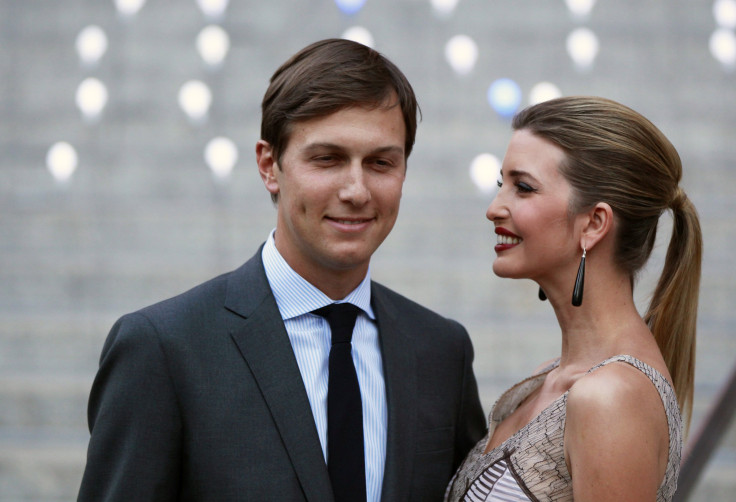Who Is Jared Kushner? Everything You Need To Know About Donald Trump's Senior Adviser And Son-In-Law

As Jared Kushner, Donald Trump’s son-in-law, moves from New York’s Upper East Side to Washington for a possibly illegal position as the president-elect’s senior adviser, he’ll be leaving much behind in the Big Apple: the newspaper he owns, the Orthodox Jewish temples he and his traditionally Democratic family would frequent on Saturdays and the real estate firm from which he made his fortune.
Kushner, however, is from New Jersey, where his father, Charles, the son of Holocaust survivors who came to the U.S. as poor immigrants, transformed Jared’s grandfather’s real estate firm, Kushner Cos., into a major industry player on the East Coast.
Charles Kushner — a major Democratic donor and philanthropist who, as one family friend once remarked to New York Magazine, “saw himself as the Jewish Kennedy” — served as a mentor to Jared, along with siblings Josh, Nicole and Dara.
That is, until his 2005 prison sentence.
He pleaded guilty to 18 counts of tax evasion, witness tampering and illegal campaign donations. The prosecutor for the case, in which Charles Kushner blackmailed his brother-in-law by setting him up with a sex worker and filming the encounter, was none other than Trump surrogate and New Jersey Gov. Chris Christie.
A year after Charles Kushner began the two-year sentence, Jared Kushner had already begun exhibiting his father’s business acumen, buying up the New York Observer, known for its focus on real estate, politics and the city’s socioeconomic elite, for $10 million while simultaneously studying for law and business degrees at New York University. Kushner previously had graduated in 2003 from Harvard University where his father had pledged a $2.5 million donation five years earlier.
Kushner’s ownership of the Observer came back to haunt him on the campaign trail in July when an entertainment writer at the newspaper published an open letter to him, citing an anti-Semitic tweet from Trump’s account. The tweet, which featured a six-pointed star and a backdrop of dollar bills, has since been deleted and replaced with a graphic featuring a circle in place of the Star of David silhouette.
“You went to Harvard and hold two graduate degrees,” wrote Dana Schwartz, the Observer writer. “Please do not condescend to me and pretend you don’t understand the imagery of a six-sided star when juxtaposed with money and accusations of financial dishonesty. I’m asking you, not as a ‘gotcha’ journalist or as a liberal but as a human being: How do you allow this? Because, Mr. Kushner, you are allowing this.”
His religious affiliation aside, Kushner’s personal and professional moves have brought him closer to Trump in the past decade. While his father served out his sentence, the recent grad became the face of Kushner Cos., growing the real estate firm’s scope beyond the boundaries of New Jersey and into Manhattan where he eventually set a record for the purchase of a Midtown skyscraper and, as executives familiar with the company told the New York Times, helped the company acquire $7 billion worth of property in the past 10 years.
When Kushner met the president-elect’s eldest daughter, the two were what the business publication Crain’s New York called at the time “a match made in real estate heaven for two survivors of tabloid hell.” They married in October 2009.
To win the approval of Kushner’s Orthodox Jewish family, Ivanka converted, remaining “pretty observant” and keeping kosher, as she told Vogue in 2015.
But while his family and faith have clashed with rhetoric from the Trump campaign, his real estate work may — like Trump’s — clash with the duties of public office.
Kushner Cos. has been in negotiations with the Anbang Insurance Group, a Chinese conglomerate plagued by U.S. national security concerns due to its convoluted corporate structure and ties to the government in Beijing, for the sale of 666 Fifth Ave., which the American firm bought in 2007 but has had trouble covering its debts since, the New York Times recently reported.
Adding to Kushner’s potential legal dilemmas as he enters the public sphere, Article 5 of the U.S. Code contains a rule that states federal officials “may not appoint, employ, promote, advance or advocate for appointment, employment, promotion or advancement” of relatives. The rule includes “son-in-law” within the blanket term “relatives.”
Kushner will not take a salary, but ethics specialists on both sides of the aisle have described his appointment as categorically illegal.
“We’re not talking about Kushner running a side task force here. We’re talking about a regular staff job,” Norm Eisen, the former head ethics lawyer in Barack Obama’s administration, told Politico. “This falls right in the bull’s eye of the statute. I think it’s illegal.”
Richard Painter, who had a similar position under George W. Bush, added Kushner’s taking on the role of senior adviser is “highly inappropriate.”
“I don’t know why they think they can,” Painter told Politico. “Just read the language in the statute.”
© Copyright IBTimes 2024. All rights reserved.












